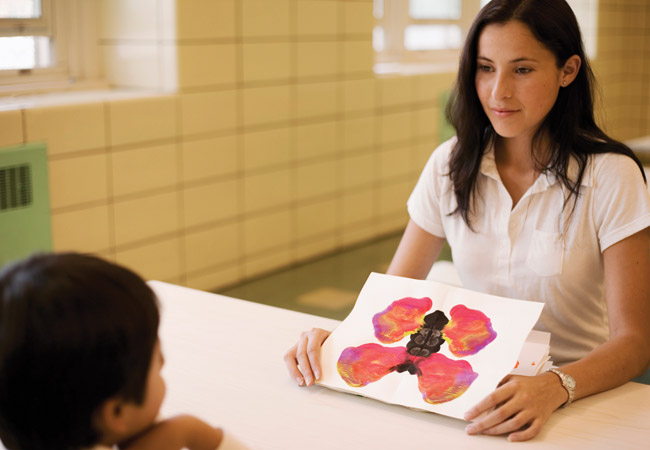
Is your child depressed?

Depression in children is on the increase
Anxiety is the most common psychological disorder of childhood, with depression not far behind, says psychologist Dr Sam Cartwright-Hatton.
We tend to think of the dark fog of depression as a primarily adult condition – the weight of the world, increasing responsibilities and high expectations are all a big part of the adult world. But children live in the moment, a carefree existence with relatively few responsibilities and a whole world of possibilities in front of them. Surely they’re immune to feeling depressed, aren’t they? Apparently not.
“Anxiety and depression are surprisingly common in childhood, and even more so in adolescence,” says Dr Sam Cartwright-Hatton, psychologist and author of Coping with an Anxious or Depressed Child. “It is now widely believed that anxiety is the most common psychological disorder of childhood, with depression not far behind.”
For some children it’s a phase that they eventually grow out of but for many it’s something they will take with them to adulthood.
“For every child who grows out of it, another child will be bothered by bouts of anxiety and depression throughout their life, until they are treated,” says Dr Cartwright-Hatton. “Recent research is even starting to suggest that most adults who are anxious or depressed started to have these problems when they were children or teenagers.”
How common is it?
At least three per cent of children between the ages of three and 16 have a depressive disorder every year. By the teens, this balloons out to around one in five children experiencing regular depressive moods. Many of these go undiagnosed.
Understandably, many parents wish to avoid the antidepressant option; though for severe depression, this is not something that shouldn’t be dismissed lightly. Complementary and alternative medicine (CAM) approaches are becoming increasingly popular and success stories abound.
“The majority of people with depression try complementary therapies,” says Dr Shaun Holt, author of Depression: Natural Remedies That Really Work.
“They tend to be looking for symptom relief, information on their illness, treatment options that are not part of conventional medicine, a ‘holistic’ approach to their illness, improved quality of life, and self-help advice.”
As a parent, exploring new avenues of treatment and prevention arms you with invaluable information that can help your child emerge from the heavy cloak of depression.
Why is it on the increase?
Depression is not new but the number of children now being diagnosed with depression is unprecedented – at least in the West.
“At the heart of the depression epidemic is the enormous pressure our modern lifestyle places on the unsupported and increasingly fragmented family, commercial interests that target even younger ‘consumers’, and a deteriorating social and ecological environment,” says Dr Bob Murray, psychologist and co-author of Raising an Optimistic Child.
“All of these can create trauma in young children, deprive them of their emotional needs, and strip them of their innate optimism.”
What causes depression?
Establishing an exact cause is virtually impossible – depression is an elusive beast. There is a natural tendency for parents to blame themselves for the way their child feels, but while a parent can be a huge influence, there are usually a number of factors at play – both genetic and environmental.
According to the Journal of the American Academy of Child and Adolescent Psychiatry, 25 to 30 per cent of women suffer from depression, and children of depressed parents have a 40 per cent chance of also developing depression. But children of parents who have dodged the genetic bullet don’t automatically avoid the risk of depression altogether.
“Family stresses and their effects on the child are far more potent risk factors for depression than individual genetic predisposition – although these environmental factors can turn the gene for depression on, or off,” says Dr Murray. “In fact, your child can become depressed without ever having that gene, or be depression-free even if he does.”
Many food scientists also believe that depression can be triggered, or at least aggravated, by a diet that is high in processed foods, which may contain harmful additives, trans fats and pesticides, and is low in fresh fruit and vegetables.
“Brain cells are supplied with nutrition from the blood,” says Dr Holt, “therefore, people who are diagnosed with depression might like to first look closely at what they eat on a regular basis. Changing the diet can often improve mental health by reducing mood swings, anxiety and depression.”

Symptoms to look for
In many ways, adults are a lot more transparent than kids when it comes to depression. With children, you need to be watchful for the signs.
“Every child is different, and children react differently at different ages – or even on different days,” says Dr Murray. “Your child’s depression might show up as sadness and listlessness or as irritability and defiance – or even as a consistent stomach ache or headache that your doctor can’t explain.
“Depression can also show up as sleeplessness and anxiety or regressive behaviours such as bed-wetting at the age of six. More than 70 per cent of children diagnosed with ADHD are also depressed or anxious, and some experts believe that many behaviours classed as ADHD are just how depression shows up in boys. Certainly, both are frequently misdiagnosed.”
Recognising the early signs of depression is vital.
“It’s vital to your child’s well-being, not only now, but later,” says Dr Murray. “Experts agree that early depression is a strong predictor of later depression and that the earlier you notice this illness, the easier it is to overcome.”
But that doesn’t mean you should be making your own diagnosis of depression just because you spot one of the symptoms mentioned,” says Dr Cartwright-Hatton.
“Diagnosing these disorders is a complex skill that many highly trained and experienced professionals still struggle with,” she says. “So, please don’t attempt to do any diagnosing yourself, you will only risk needless worry.”
Talking therapies
Doctors are more reluctant to prescribe antidepressants to children with mild-to-moderate depression than adults, generally recommending a form of psychotherapy first. This could take the form of cognitive behavioural therapy (CBT) or general counselling, where a parent may or may not be in the room at the same time, depending on the age of the child and appropriateness.
In some instances, family therapy may be a good option if you are worried about the interpersonal relationships within your home, and art therapy or play therapy is worth considering if your child is very young.
“Play therapy is typically used with very young children who are not chronologically old enough to express their emotions,” says Dr Rebecca Rutledge, author of The Everything Parent’s Guide to Children with Depression. “Dolls, stuffed animals and puppets are great tools for having a conversation with a child. Often, the child is the doll, animal, or puppet’s voice. It is easier for her to say tough things when she believes it is coming out of someone else’s mouth.”
But perhaps the most common and successful psychological method for treating depression is CBT, an approach that aims to change the way your child views themselves and the world.
“The sort of things that the therapist will ask your child to do is complete fun worksheets, do little experiments to test out whether their thoughts are true or not, and play games to try out new ways of thinking,” says Dr Cartwright-Hatton. “Although some difficult conversations can come up in CBT, the aim with children is to try to make the sessions as fun as possible.”
Antidepressants are increasingly considered an option for children with severe depression and more common again for adolescents. In some instances, children or the parents are reluctant to commit to a talking-based therapy and instead want a ‘quick fix’. But antidepressants don’t always work for children; it can be difficult getting the dose right and ensuring they actually take it, there is an array of unpleasant side effects and it doesn’t offer a cure.
Author: David Goding.


